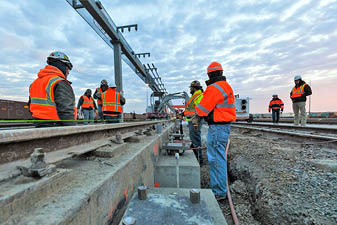|
By Cecile Entleitner, Senior Associate, Blakey & Agnew
The Bipartisan Infrastructure Law (BIL), enacted in November 2021, provided over $100 billion in competitive grant funding for programs administered by the U.S. Department of Transportation over the next five years. Several of these programs, both existing and newly established by the BIL, aim to fund major freight and other “transformative” infrastructure projects across the country. In a recent report on freight supply chains, USDOT listed among its top priorities the investment of BIL funding in freight projects of national and regional significance. In support of this goal, USDOT is now accepting applications for $2.9 billion in available grant funding for multimodal transportation projects.
In March, USDOT issued a combined notice of funding opportunity (NOFO) for three major grant programs funded by the BIL. Under the “Multimodal Projects Discretionary Grant Opportunity,” applicants may submit projects for one, two, or all three of these grant programs through a single application. USDOT hopes this new approach will streamline the application process and reduce administrative burdens, particularly for smaller communities.
Applications will be evaluated based on each grant program’s individual statutory requirements as well as six broader selection criteria. These criteria will assess factors such as the extent to which projects improve safety, increase economic competitiveness, and facilitate efficient and reliable freight movement. Consistent with previous NOFOs issued under the Biden-Harris Administration, several evaluation criteria incorporate environmental, labor, and equity considerations.
The Infrastructure for Rebuilding America (INFRA) program is the only program of the three that was not newly established by the BIL – USDOT has awarded INFRA grants annually since 2016. The freight-focused program is available to highway, bridge, rail, port, and intermodal projects. As required by the BIL, project eligibility has now been expanded to include wildlife crossing projects and marine corridor projects. The BIL provided $1.5 billion for fiscal year 2022 INFRA grants, an increase compared to the $1 billion available in FY21. A maximum of 85 percent of INFRA funding is reserved for large projects, generally defined as projects with a total cost of more than $100 million, though this threshold is lower for certain states. No more than 30 percent of total INFRA funds each fiscal year – up to $482 million for FY22 – may go toward non-highway freight projects.
|

The second program accepting applications under the combined NOFO is the National Infrastructure Project Assistance (MEGA) program, a new discretionary program created by the BIL. As the name suggests, this program is geared toward large infrastructure projects that may not have previously qualified for federal funding sources due to their size, complexity, or multijurisdictional nature. In FY22, $1 billion is available for MEGA grants, though USDOT notes that it may make project awards for future fiscal years through multiyear grant agreements. At least 50 percent of MEGA funds are reserved for projects with a total cost above $500 million, the remainder will go toward projects with a cost between $100 million-$500 million. While both the INFRA and MEGA programs are focused on large project needs, the MEGA program offers broader eligibility. In addition to highway, bridge, rail, port, and intermodal freight projects, the program is also available to large transit projects.
Lastly, the NOFO solicits applications for the Rural Surface Transportation Grant Program (RURAL). This new program established by the BIL received $300 million for FY22, at least 90 percent of which must be for awards of $25 million or above. The program will fund highway, bridge, and tunnel projects in rural areas. Eligible projects should improve goods movement, safety, and/or provide or increase access to agricultural, commercial, energy, or transportation facilities that support rural economies.
Grant applications are due May 23, at which time USDOT will begin its review process. Investments in critical infrastructure projects under this funding opportunity can benefit our economy, national supply chains, and quality of life for years to come. As President Biden said during his State of the Union address, “we’re done talking about infrastructure weeks. We’re now talking about an infrastructure decade.”
Blakey & Agnew, LLC is a public affairs and
communications consulting firm based in
Washington, DC.
|


